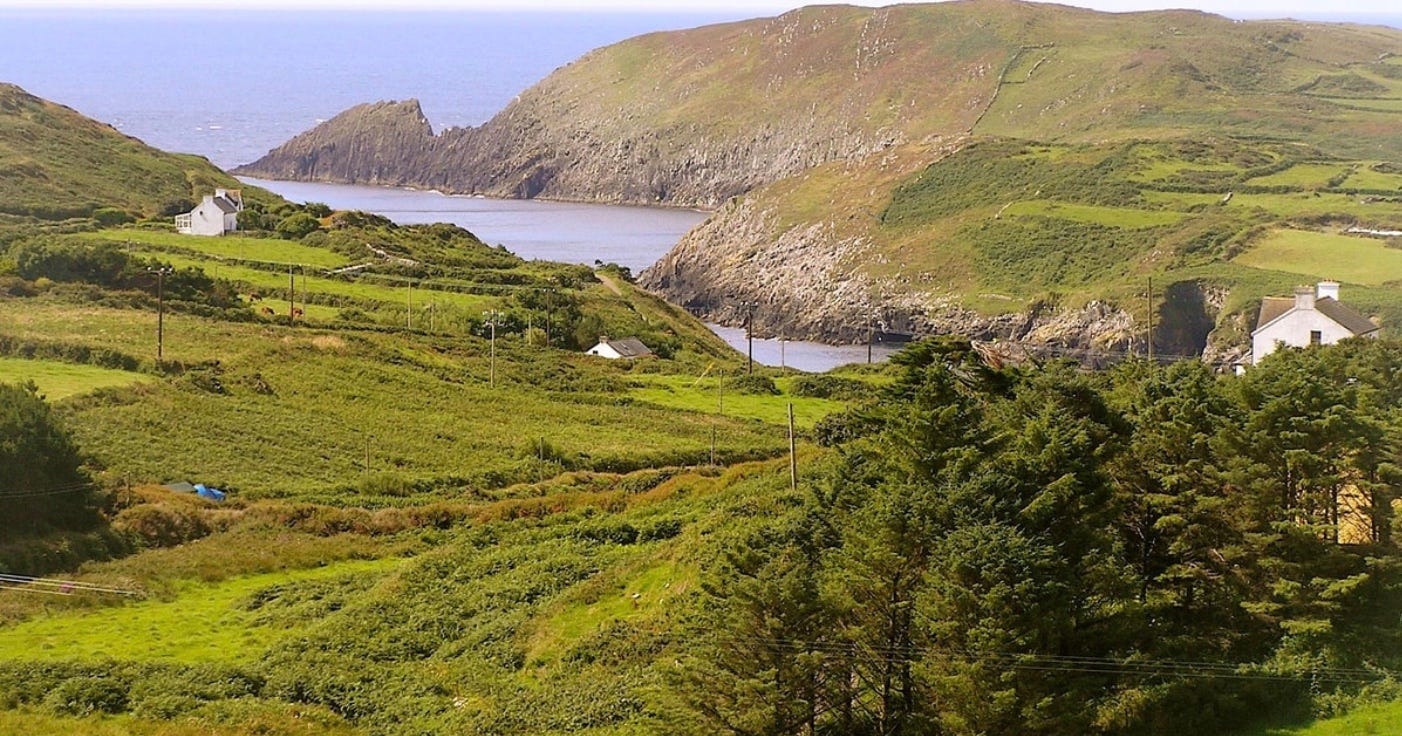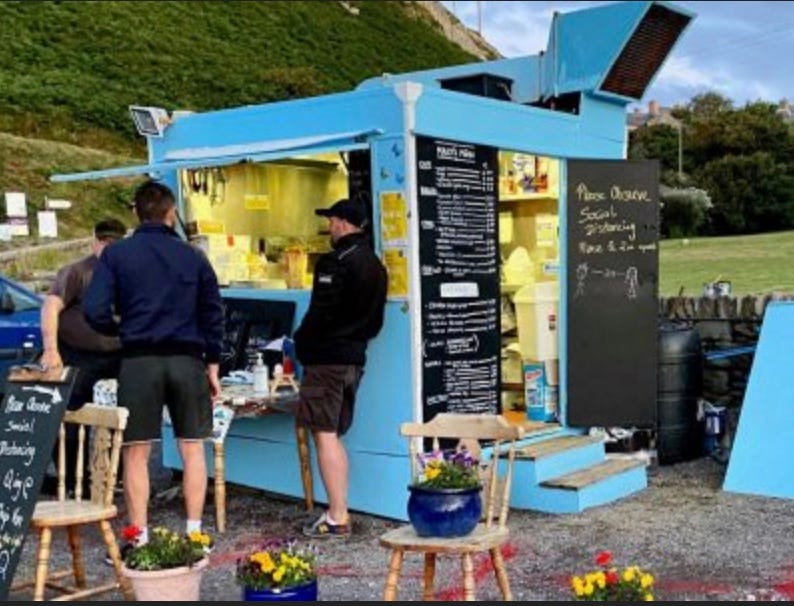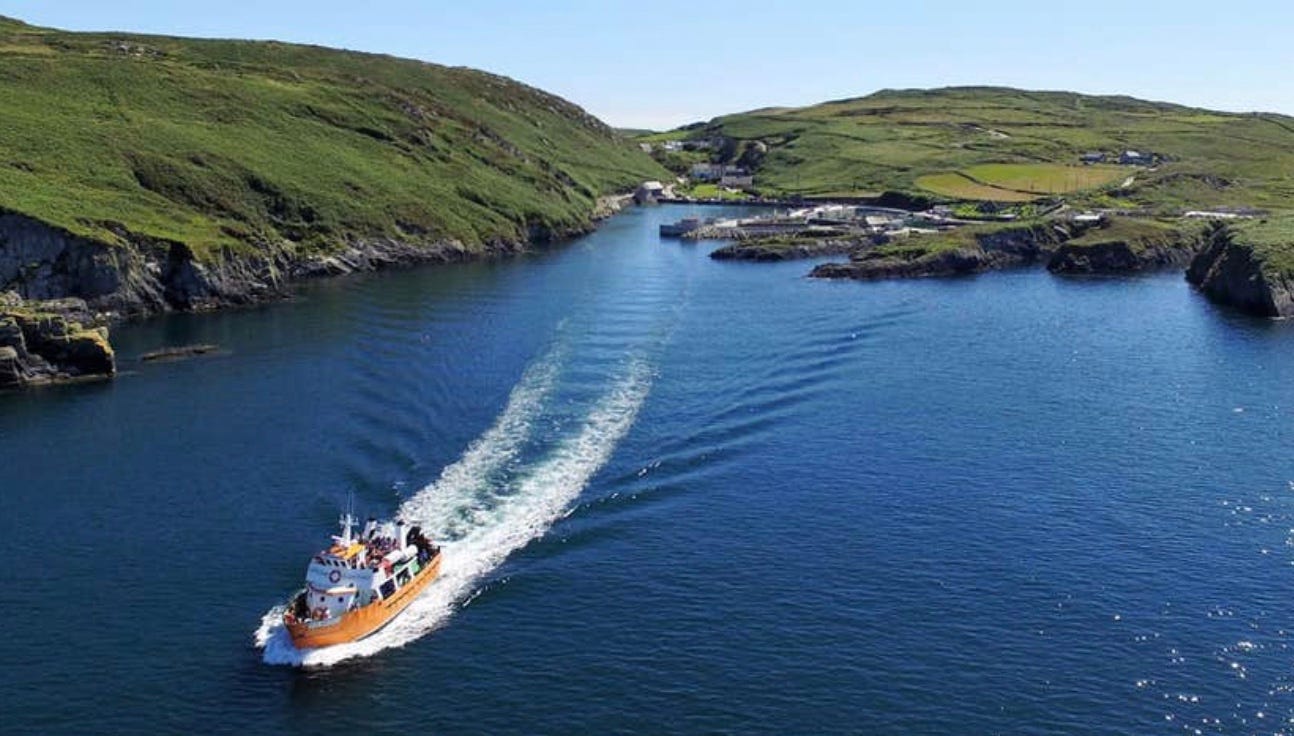Last weekend was the 30th anniversary of the Cape Clear International Storytelling Festival, and finally, I was able to attend.
What a difference a 40-minute ferry journey makes, for in those 40 minutes you have left the mainland—in this case, Baltimore in southwest Cork—but you have left it not just in a physical sense; you leave it and step into island consciousness, into a liminal space of betwixt and between, where the laws that applied just 40 minutes ago are now that bit more flexible.
They brought five storytellers to this island, three from Ireland (Cork, Kerry, and Dublin), one from Orkney Island, and one from Iran. Over the course of three days, we all meandered the same lanes, drank in the same pub, and mingled in the same little coffee shops, stepping in and out of the little worlds evoked in the storytelling. From there, we stepped back out under the swift moving clouds and the shifting liminal ocean current, raising up the boats on the tiny protected harbour.
Mary’s Chipper—a wee blue box on wheels facing the ferry—is captained by Mary herself, a local island woman, eccentrically warm-hearted and uncrossable. Wearing a trilby hat, a long coat, and comfortable and efficient crocs, she commands authority and the unquestionable power of being the source of the best chips and burgers on the island. Mary is also, without doubt, the National Tourism Development Authority of Cape Clear, and proudly so, she loves her island and loves being the first face of welcome for new arrivals.
But back to the chips. You can feel the slow march of time, like a great churning stone wheel, inching forward as you wait for your moment to arrive, thanks to Mary's eccentric system. Old man Chronos of Greek mythology can be seen snoozing in the corner. Even Oisin in Tir na Nog, the land beyond time, would find impatience creeping in as he waited to be satiated. But this is island consciousness. Put aside your mainland ways, your expectations born on the streets of the cities and towns. It’s a brave man that would suggest to Mary a new method of distributing her chips; she’s no fool; she’ll make her chips at her own pace or not at all. She doesn’t need to explain this; it’s communicated in every breath and action she takes.
So I sat down and waited. As I did so, another island man, straight out of a book of photography, his face like a rock face populated by seabirds, suddenly appeared as though stepping from a veil. A woman with Asian features accompanied him, expressing nothing but a simple smile. He spoke to Mary in that easy this and that way, a gentle back and forth like a breeze catching a child’s hair, speaking about his plans for the day. Mary intervened, appearing slightly perplexed.
‘It’s Saturday today, Michael.’.
‘Is it, ohh, I thought it was still Friday’
The chips finally arrived—in the space of time it took the Iranian storyteller to spell out the opening salvo of the monumental epic Rostam and Sohrab from the Shahnameh up on the hill. I missed that, but at least I was being fed, and I’d catch her later. As one woman said to me over the weekend, Cork has notions about food, Cape Clear doesn’t.
I walked to Ciaran Danny Mikes, the ‘Pub without Drink’, to catch my first storytelling session. Padriag O Briain of Kerry and Tom Muir from Orkney held the floor. Now, there’s nothing quite as at home in its environment as a Kerryman with a gift for storytelling standing forth with a group of attentive listeners. Padriag, being an actor of many years and an advocate of the Irish language, took us all on a journey into the countryside of Kerry and the exploits of opportunistic farmers and lonesome Joe’s, to copious amounts of drink and more than a few appearances of the ‘divil himself’. In true Irish fashion, Padraig showed his liking and respect for his fellow storyteller by 'slagging him off’ on multiple occasions. And Tom, smiling benignly, stepped up for his turn and took us on a journey to his own island home, to Orkney, for a series of tales of pain, sadness, and redemption. A fine pair they made, and everyone left smiling and thirsty.
There’s one pub, Cotter’s, so everyone goes there. Seven musicians sat inside the entranceway, and the conversation was so loud around them that as I stood within 3 feet of the piper, I still strained to hear a note. Conversation was the music of the night, and everyone was handing pints around and feeling like they’d escaped the shackles of the mainland for a day. I asked the proprieter what time the last orders were, and he answered with a single eye that more or less said, ‘If I’m standing up behind the bar, I’m still serving.’ I spent a good part of the night being told about the steepness of the hill I’d have to climb to get to my hostel. Anyhow, being not a big drinker, a couple of pints of stout is good enough for me, and wanting to be relatively fresh for the Sunday of storytelling ahead, I decided to tackle the hill. But a friend of my friend would hear nothing of it. ‘I’m feeling generous,’ she said, and she piled myself, my friend, and her husband into the old Toyota Corolla and, entirely not over the limit, took us home to our bed for the night.
The sun rose again on Cape Clear. The second most important thing on a new day—the first being waking up and finding yourself still alive—is to find a good cup of coffee. Having done that, we walked back down the hill, meeting a couple camping behind a ditch, all smiles and good mornings. We picked a few blackberries, stepped onto the verge as one of the very few vehicles on the island passed by, and walked back into the little village. People were up and about, making their way to the workshops, the island walks, cueing for chips and cups of tea, chatting easily, this being the last day, the ferries departing at 12, 4pm, and 6pm. Sore heads and tired eyes about us, but another fine, bright day, a bit breezy, but in these parts a fine day indeed.
Zahra Asfah is the storyteller from Iran, and I didn’t want to leave without catching her. Now, this is an entirely different style of storytelling, as distinct from Padraig’s Kerry tales as you could get. And indeed, Zahra had her work cut out. A tiny cabin on an island is quite different from the opulent halls of a Persian palace. Yet Zahra took to the stage full of energy and confidence, with John Spillane weaving little Arabesque notes on the guitar beside her, and told the tale of unrequited love, a handsome prince, and a firebird on the hill. It wasn’t everyone’s cup of tea. Some heads were probably too marinated in Guinness to take such a leap of imagination; they could imagine falling asleep in a Persian tent in the shade, but not much beyond that. It was more bacon sandwiches than date palms on our minds. But Zahra received a well deserved applause upon conclusion and we were all happy the Princess got up the hill eventually. We were back on more familiar ground when Tom Muir stepped up again and told us stories from a cold, wet island up north where people were mostly concerned with staying warm and not being abducted by scheming faeries.
And the last day rolled on. I filled up on what sessions I could catch, culminating in the Grand Finale in the hall of the local school where each teller did a last little rendition of something, and John Spillane closed out with a song or two about songbirds and a sing-along about the Boys of…such and such.
And so the festival drew to a close. What a difference a ferry journey makes. Just 40 minutes from the mainland but many years away. The boat departs and the spell is uncast, unwinding back to normality, resetting the clocks, and returning to more solid ground. We sailed home on the last ferry, a few of the storytellers with us, the local committee and volunteers, and well wishers waving white tissues and singing songs of farewell as we moved off. And in the near distance, a bright blue beacon, Mary’s Chipper, began frying a fresh skillet of chips.








Fantastic
I loved it.
Thanks .